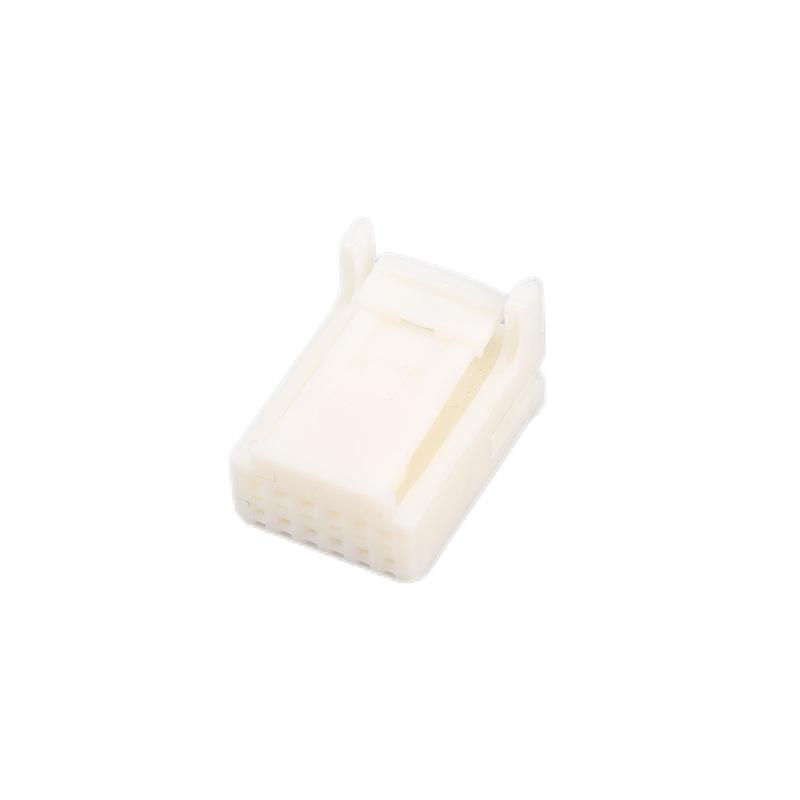 The DJ70121S-0.7 car connector is renowned as the most frequently utilized connector in the low-voltage electrical circuitry of automobiles. Its popularity stems from its reliability, durability, and versatility. The 0.7 series connectors, including the DJ70121S-0.7 variant, offer a comprehensive range of options, with positions ranging from 2 to 40, catering to a wide array of connection needs in automotive applications.
The DJ70121S-0.7 car connector is renowned as the most frequently utilized connector in the low-voltage electrical circuitry of automobiles. Its popularity stems from its reliability, durability, and versatility. The 0.7 series connectors, including the DJ70121S-0.7 variant, offer a comprehensive range of options, with positions ranging from 2 to 40, catering to a wide array of connection needs in automotive applications.
Manufactured from high-quality nylon plastic and copper, this connector ensures both strength and electrical conductivity. The nylon plastic provides excellent resistance to wear and tear, while the copper ensures efficient and safe electrical transmission. This combination of materials makes it an ideal choice for use in automobiles, where durability and reliability are paramount.
The DJ70121S-0.7 car connector is primarily used in automobiles, where it plays a crucial role in the low-voltage circuitry. It is commonly found in various automotive systems, including the electrical system, the lighting system, and even the air conditioning system. Its versatility and adaptability make it a go-to choice for automotive manufacturers seeking a reliable and efficient connector solution.
Product Parameters
Product model | DJ70121S-0.7 |
Voltage rating | 300V AC/DC max |
Temperature range | 125℃ |
Interval | 2.2mm |
material | PA66+GF |
Products Features:
Reliability: Automotive connectors must be able to work stably under a variety of harsh environmental conditions. This includes conditions such as extreme high and low temperatures, high humidity, and strong vibrations. They are designed to ensure that automobiles operate properly and safely in a variety of road and weather conditions.
Durability: Automotive connectors need to be mechanically strong enough to remain undamaged for the life of the vehicle. This means that connectors need to be able to withstand the wear and tear and impact of everyday use, ensuring stable performance over time.
Miniaturization and lightweight: With the increasing degree of automotive electronics, the space inside the car becomes increasingly valuable. Therefore, the trend of automotive connectors is miniaturization and lightweight. This design not only helps to save space inside the car, but also reduces the overall weight of the car, thus improving fuel efficiency and driving performance.
High-speed transmission: For data communication connectors, high-speed transmission capability is essential. This meets the growing demand for data exchange within the vehicle and ensures that the various electronic systems can communicate with each other efficiently and quickly, thereby enhancing the driving experience and safety performance.
Application
Power System: Automotive connectors play a key role in the power system and are mainly used for the connection of equipment such as oil circuit, valve train, emission mechanism, engine cooling, engine control, ignition control and four-wheel drive.
Body system: In the body system, automotive connectors are widely used in power distribution, insurance, doors, windows, reflectors, heating/air conditioning and other equipment connections.
Information Control System: Automotive connectors also play an important role in the information control system for connecting devices such as instrument panels, antennas, vehicle information interconnections, and intelligent transportation systems.
Safety system: In the safety system, automotive connectors are used to connect key equipment such as ABS, seat belt system, airbag system, car collision avoidance system and pedestrian protection system to ensure driving safety.
In-vehicle equipment: In addition, in-vehicle equipment such as in-vehicle audio, GPS navigators, displays and in-vehicle computers also rely on automotive connectors for signal and data transmission.
FAQ:
Q1: What is the main function of Car Connector?
A1: The main function of automotive connectors is to connect various electronic devices and systems inside the car to realize the transmission of electricity, signals and data to ensure the normal operation of the car.
Q2: How do automotive connectors ensure the reliability of the Car Connector?
A2: Automotive connectors ensure the stability and reliability of the connection through the use of high-quality materials and precise manufacturing processes, as well as a well-designed structure. In addition, they undergo rigorous testing and validation to ensure that they work properly in a variety of harsh environments.
Q3: What are the types of Car Connector?
A3: There are various types of automotive connectors, including board-to-board connectors, wire-to-board connectors, circular connectors, rectangular connectors, and so on. Each type has its specific application scenarios and advantages, and can be selected according to specific needs.
Q4: How to choose the rightCar Connector?
A4: Choosing the right automotive connector requires consideration of a number of factors, including the connector's electrical performance, mechanical performance, environmental suitability, ease of installation and maintenance, etc. In addition, the cost factor and the ease of installation and maintenance should also be taken into account. In addition, the cost factor as well as the supplier's reliability and after-sales service should also be considered.
Q5: What is the development trend of Car Connector?
A5: The development trend of automotive connectors mainly includes miniaturization, light weight, high speed, high reliability and intelligence. With the increase of automotive electronics and the development of autonomous driving technology, the performance requirements for automotive connectors are getting higher and higher.